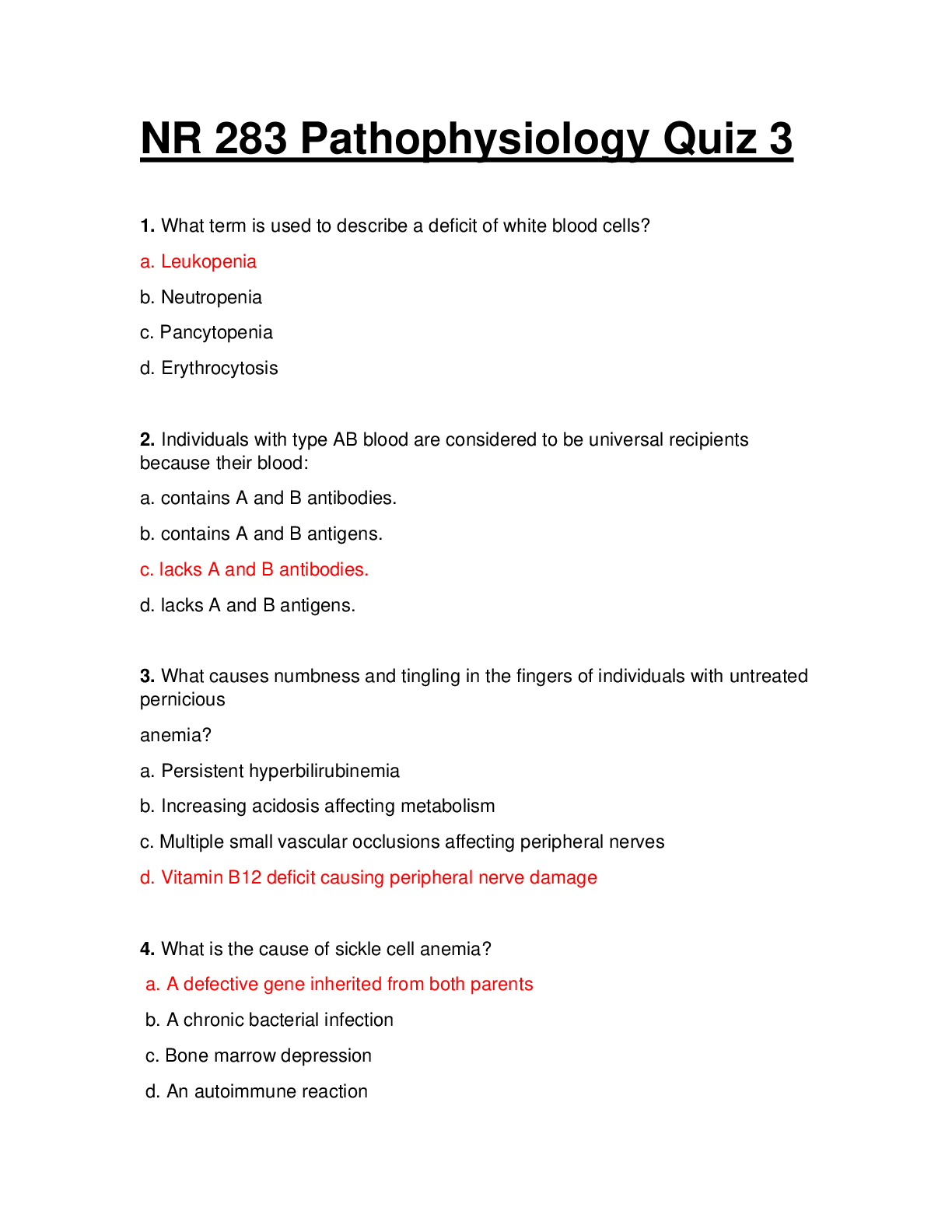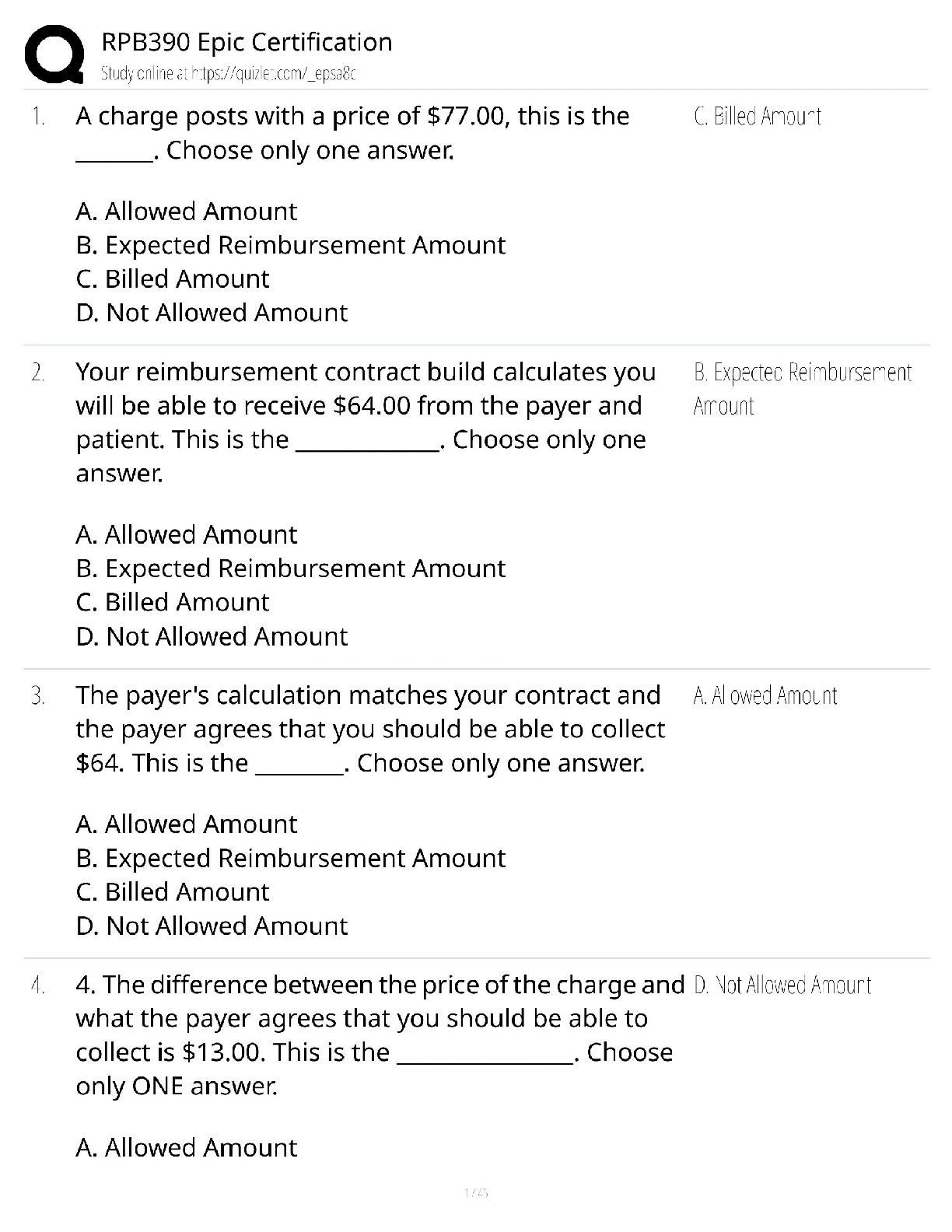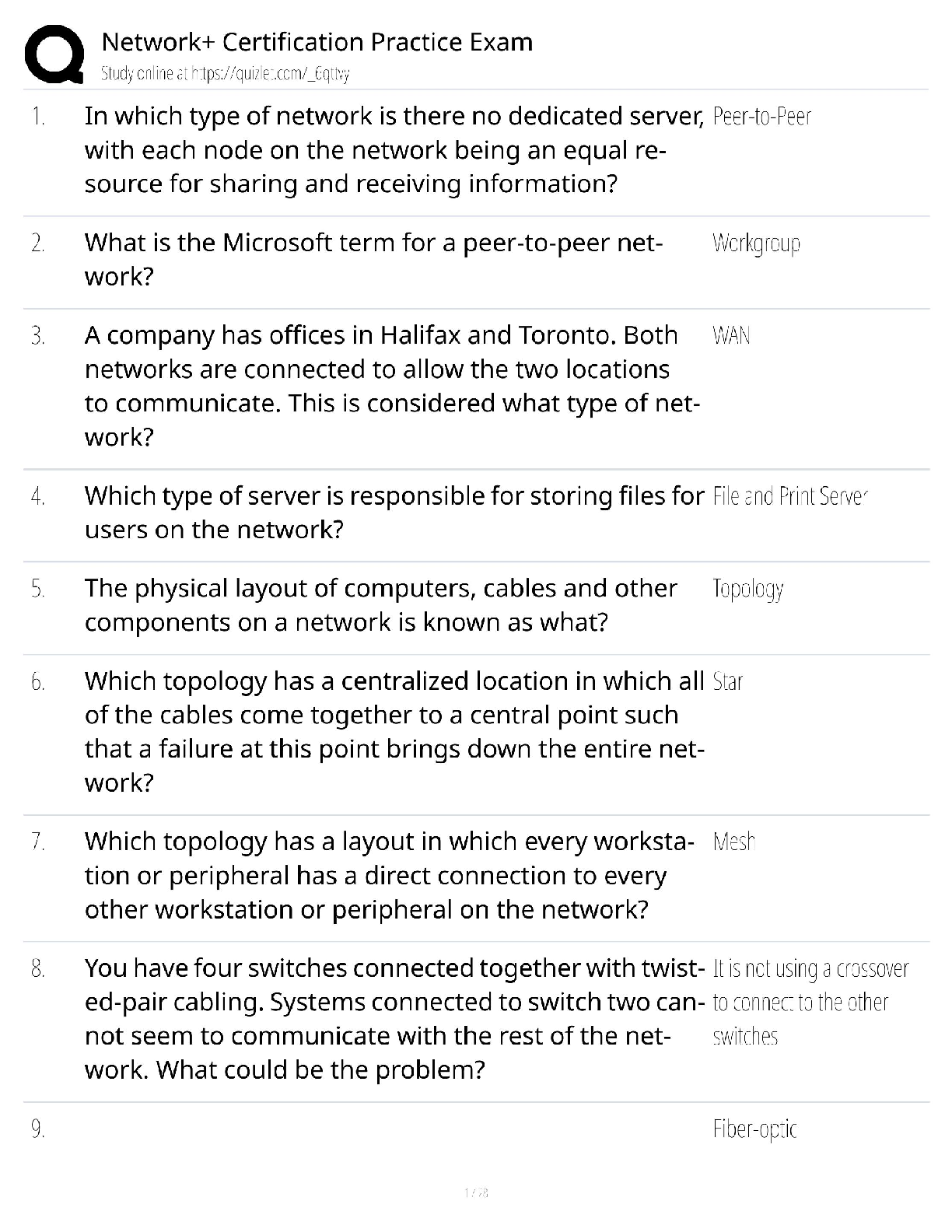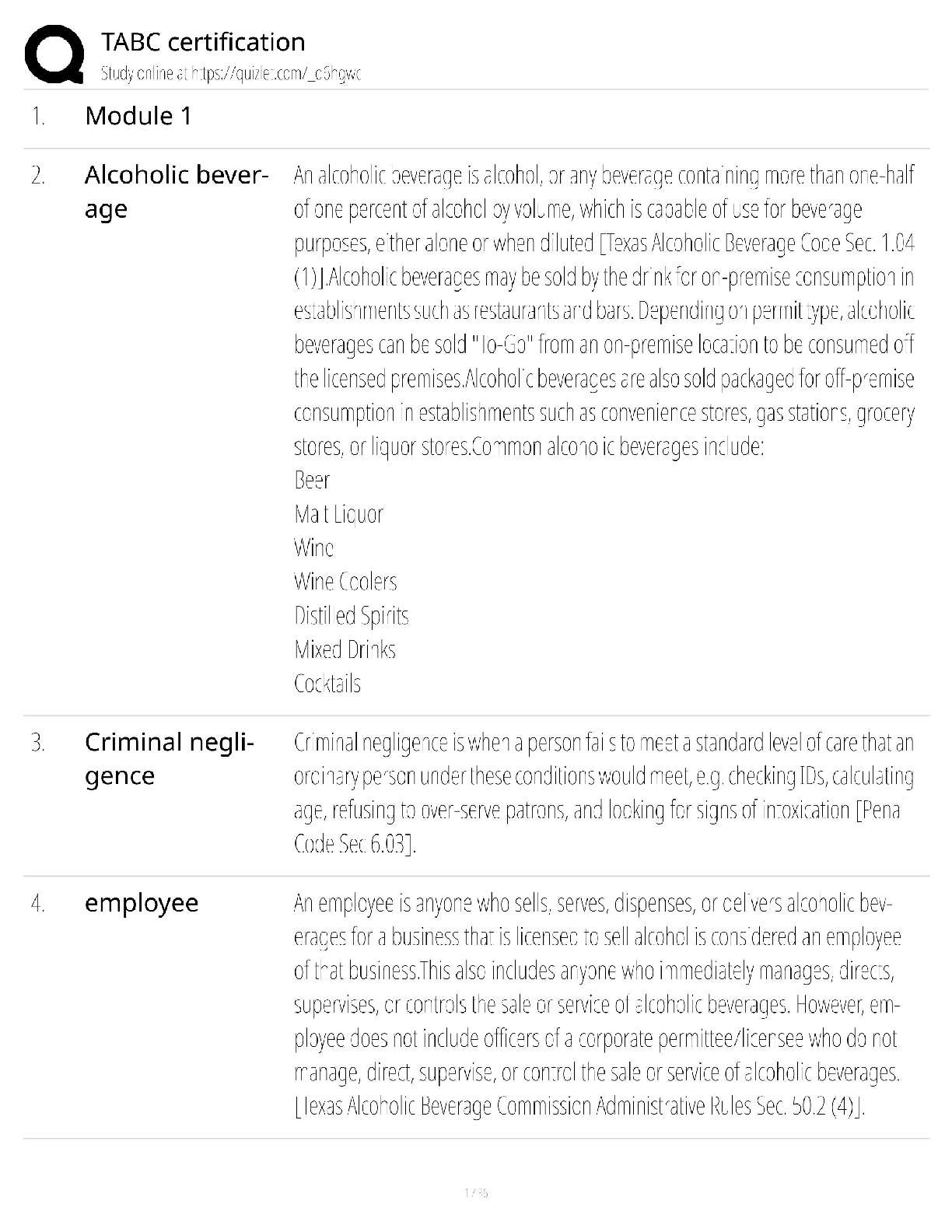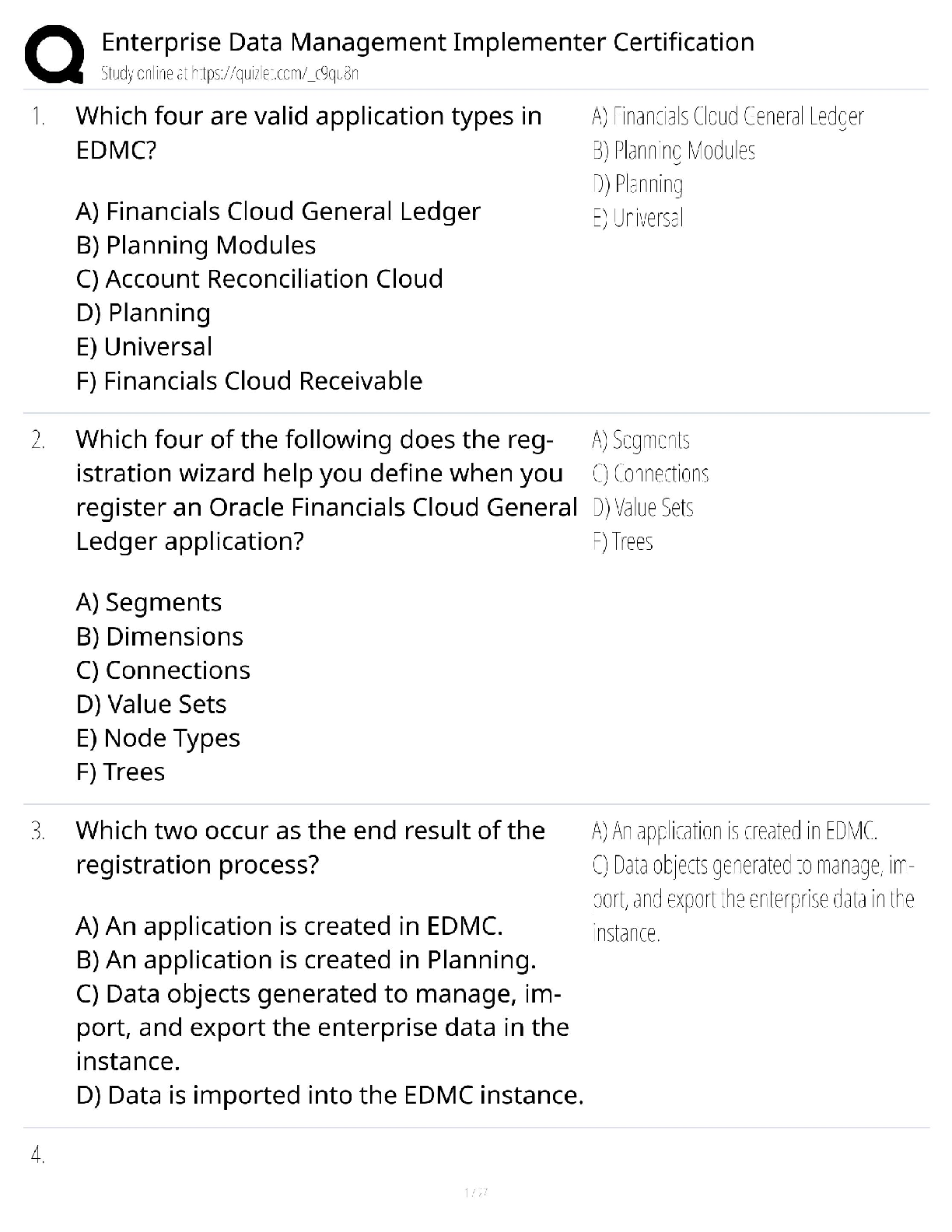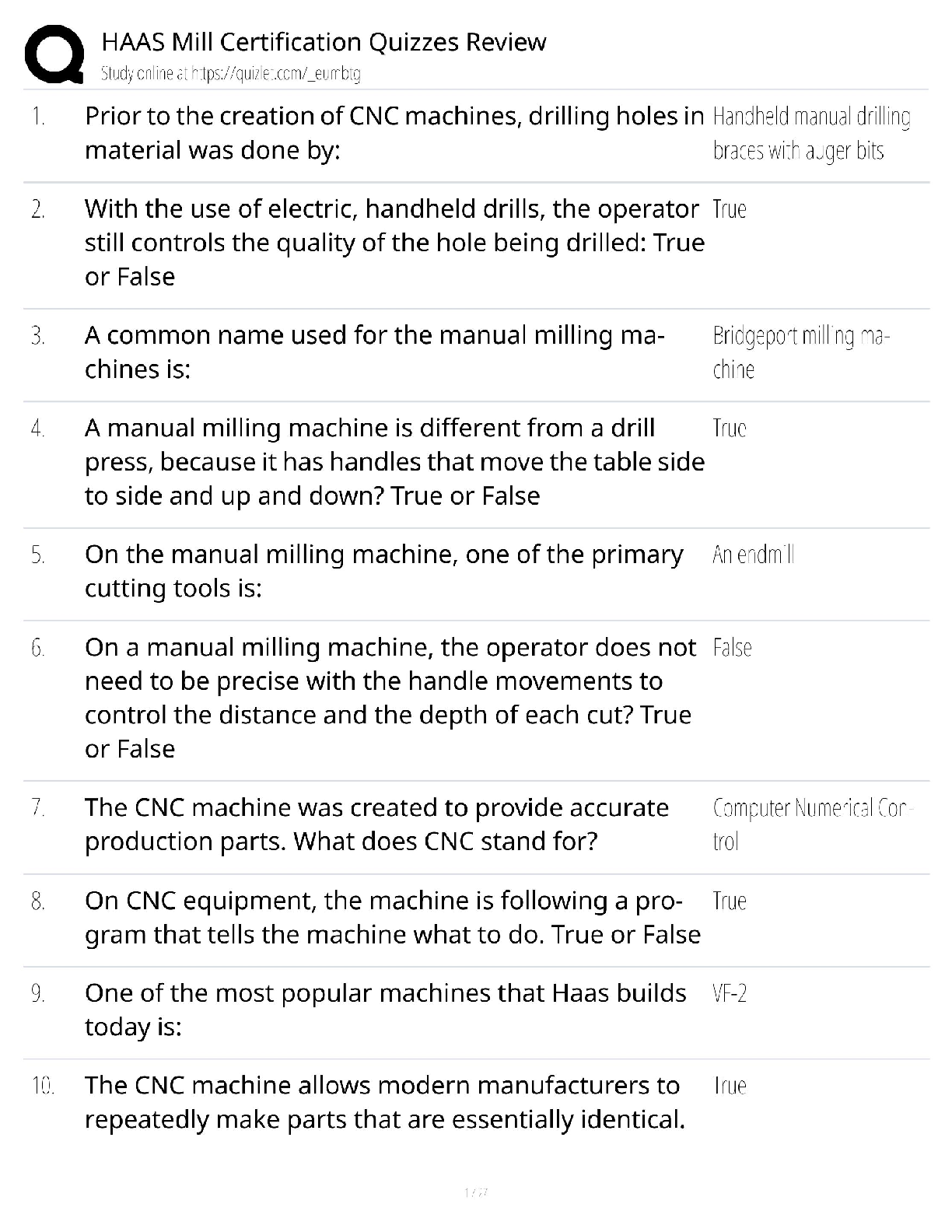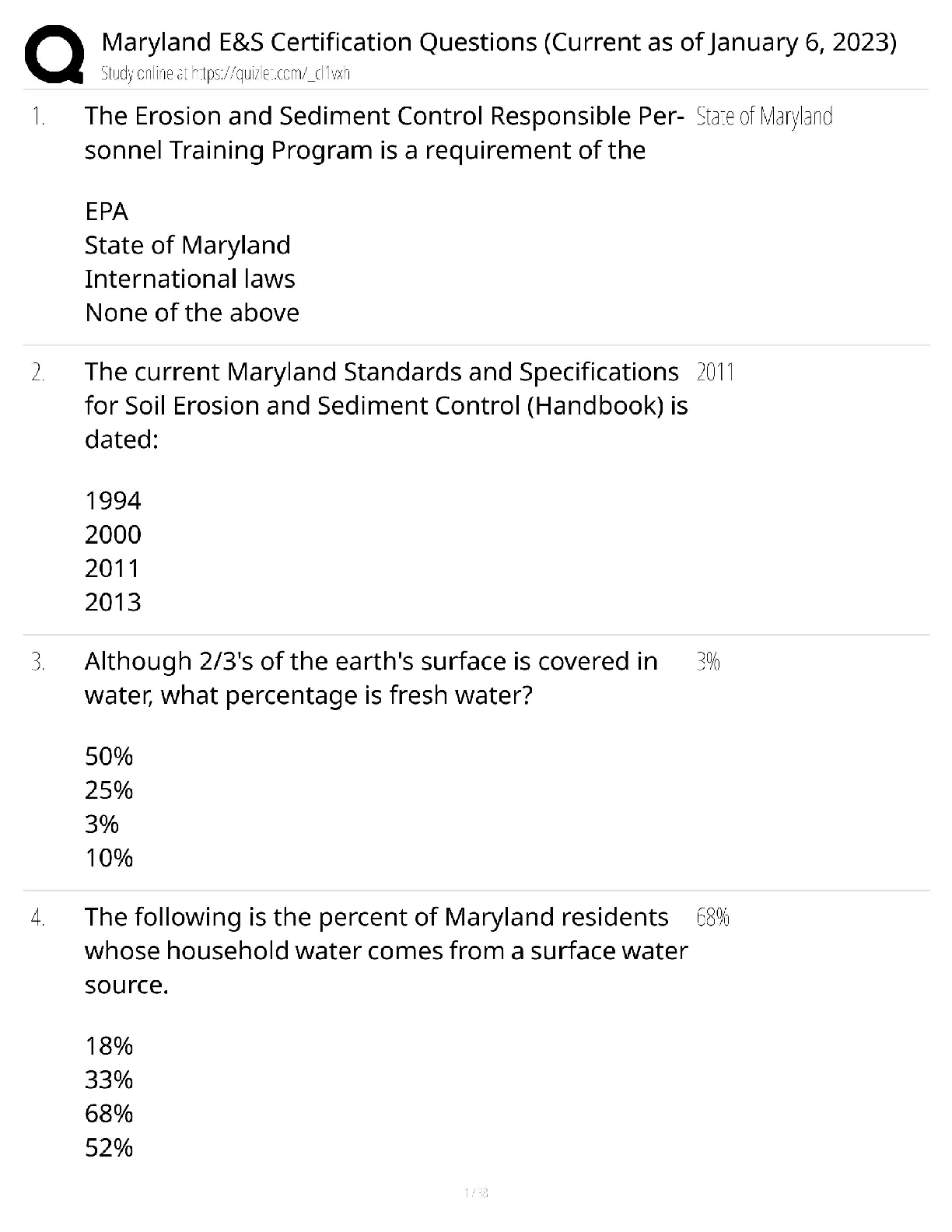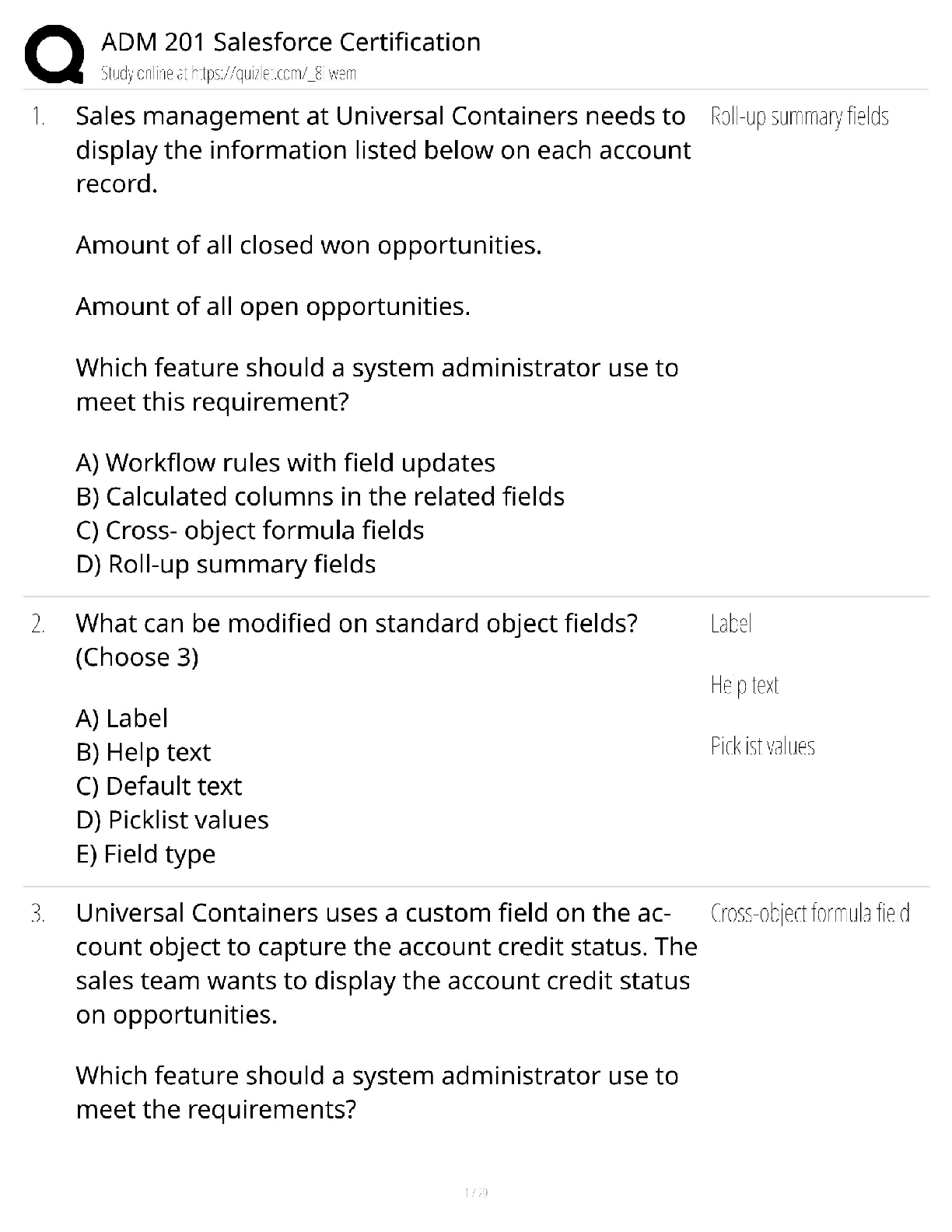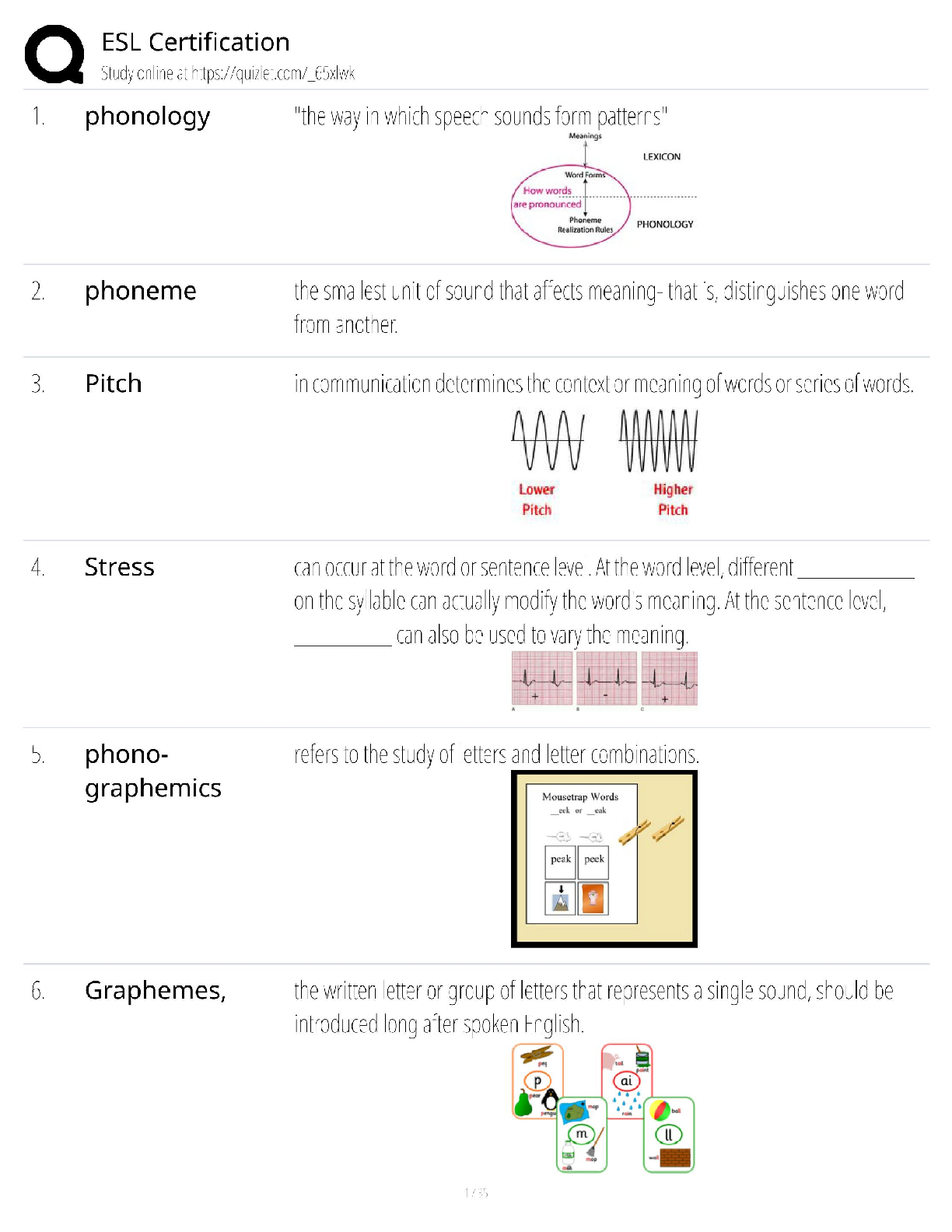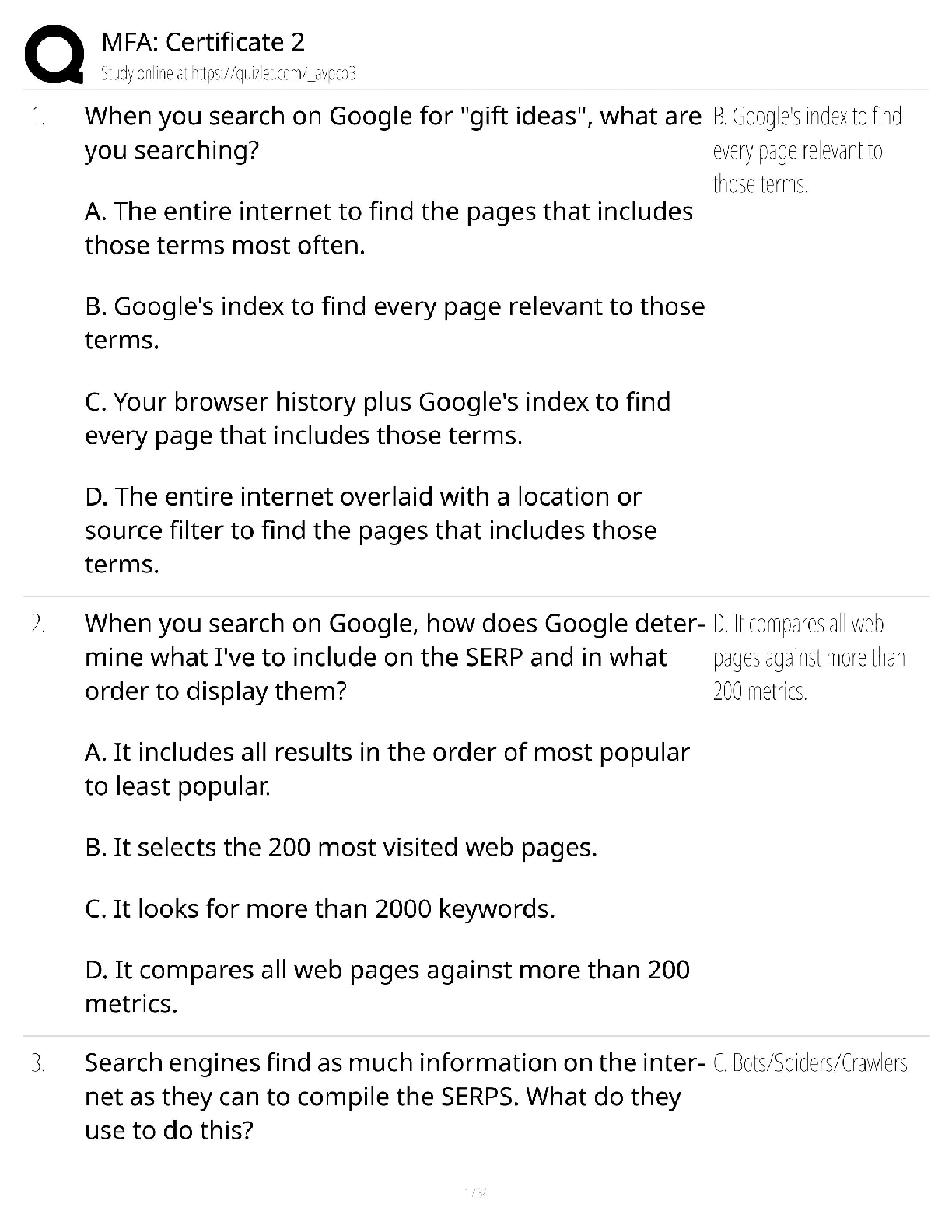*NURSING > QUESTIONS & ANSWERS > NURS 6670 Midterm Exam / NURS6670 Midterm Exam |Latest -2020|75 Q & A , Verified and 100 % Correct| (All)
NURS 6670 Midterm Exam / NURS6670 Midterm Exam |Latest -2020|75 Q & A , Verified and 100 % Correct|
Document Content and Description Below
Question 1 Alexa is a 27-year-old female who has come to group therapy while she is in the city jail. She was arrested for vagrancy because she was sleeping in her car in a parking lot at a local sh ... opping center. She could not post bail, so she is sentenced to 14 days in jail. During group, she contributes that none of this is her fault. Her mother is totally evil because she would not let Alexa stay in the family home. She has some other family. but they are all jerks because they won’t help her. Alexa’s friend Melanie is the absolute best person in the world, but she can’t help because her boss fired her for no reason. Alexa has a history of arrests for buying illegal drugs and prostitution. The last time she was in jail, her sentence was extended for 30 days because she got into a fight with another inmate and beat her up so badly she had to be admitted to the hospital for 6 days. The PMHNP considers which of the following personality disorders? a) Histrionic b) Narcissistic c) Borderline d) Schizoid Question 2 Anne is a 32-year-old female who presented to care after a random drug screening at work was positive for cocaine. She was initially resistant to therapy, maintaining that her use is not a problem and she could stop at any time. Upon further discussion in session, it appears that she uses cocaine every day at work, sometimes 2–3 times, other days more. She also uses it occasionally at home and most weekends. During her third session, she admitted that it is a financial burden, and she basically cannot afford any other form of recreation. She understands that if she uses again she will lose her job, and she admits that she loves her job and that cocaine is not worth losing it. When counseling her about cessation strategies, the PMHNP advises all the following except: a) The physiologic symptoms of withdrawal may require a short-term hospitalization b) Unlike other substances of abuse, there are no medications to help reduce the intensity of withdrawal c) She will need to be monitored for depression d) Overcoming the intense craving for cocaine is the biggest issue • Question 3 Clare’s history of personal relationships is characterized by complete intolerance of being alone. Whether it is an intimate-partner relationship or a close friend, Clare appears to always need someone in her life. She had a livein boyfriend of 3 years, and while they were together, he took care of everything. The PMHNP expects all of the following to be additional features of Clare’s history except: Has disproportionate anger toward an abusive spouse Question 4 The PMHNP is conducting an initial interview with a patient whose history is consistent with avoidant personality disorder. The PMHNP understands that one of the most striking features of this interview is likely to be centered upon the patient’s: a) Clothing b) Speech pattern c) Anger d) Anxiety Question 5 A PMHNP student is reviewing his notes from his clinical experience over the past week to prepare his first required case presentation on a patient suffering a major depressive episode. Which of the following patients best represents the DSM-5 criteria for major depressive episode? A 27outbursts of anger, and a strong family history of endogenous depression-year-old female with a 1-month history of social withdrawal, anorexia, hypersomnia, unprovoked A 41personal life, an unplanned 10 lb. weight loss in the last 3 months, and perceptual disturbances-year-old male with a history of childhood sexual abuse, loss of interest in both his professional and A 65mood, guilt about his wife’s death, insomnia, difficulty focusing on daily tasks, with increasing thoughts of -year-old male whose wife died 2 months ago and he reports a 3-week history of generally depressed dying A 72despondent about leav-year-old female who just relocated across country to live with her adult son and daughtering her home and reports forgetfulness, loss of appetite, new onset bowel problems, and -in-law who is extreme loss of energy Question 6 A variety of pharmacologic agents have demonstrated effectiveness in the treatment of post-traumatic stress disorder. Which of the following does not have any evidenced-based support in the literature? a) SSRIs b) TCAs c) Antiadrenergics d) Antipsychotics Question 7 The PMHNP is on call at the local county correctional facility. He is asked to evaluate M.S., a 21-year-old male who was just arrested following an altercation at a local bar. M.S. has never been incarcerated before and apparently has no psychiatric or medical history available. His toxicology screen was negative for alcohol or any drugs of abuse. His mother says that he has in the past had some occasions when he got kind of agitated, but this is the first time it’s been a problem. Reportedly some people from his office were at the bar celebrating a birthday, and before anyone knew what happened an argument escalated into M.S. getting very loud, yelling, and acting ―crazy‖ before he punched a coworker and started breaking bottles. When considering a manic or hypomanic episode, the PMHNP expects that his speech would most likely be: a) Stuttered b) Increased c) Childlike d) Confused Question 8 Fletcher is a 29-year-old male referred for court-ordered counseling. He has a long history of repeated offenses including DUI, domestic violence, battery, and other violent acts that fortunately have not yet caused any serious injury or death to the recipients. An interview with his wife reveals that he has lied about almost everything for the last few years; he is able to get hired for jobs because he is very engaging and likeable, and then invariably he gets fired because he misses work and doesn’t do his job properly when he is there. According to the wife, they have known each other since high school, where Fletcher was very happy and well-adjusted. He was on the soccer team, liked by teachers, and never demonstrated the tendencies he does now. Apparently in college he got involved with a fraternity that was notorious for alcohol and drug abuse, and he started drinking heavily; it was ―all downhill from there.‖ The PMHNP considers that: a) History and symptoms are most consistent with antisocial personality disorder b) Fletcher needs a neurological workup to include an EEG and assessment for neurological soft signs c) Consistent with his symptoms, Fletcher will likely respond well to a stress interview d) It is likely that substance abuse is the underlying cause of symptoms and should be explored further Question 9 Which among the following neurotransmitters is decreased in depression and increased in mania? a) Dopamine b) Norepinephrine c) Serotonin d) Glutamate Question 10 Among the various types of therapeutic intervention for patients with borderline personality disorder, which of the following is characterized as polymodal, including group skills training, individual therapy, telephone consultation, and a consultation team with a goal of improving interpersonal skills and decreasing self-destructive behavior? a) Mentalization-based treatment (MBT) b) Transference-focused psychotherapy (TFP) c) Countertransference-focused psychotherapy (CTFP) d) Dialectical behavioral therapy (DBT) Question 11 Mr. Kendall is a 47-year old male who is presented to care by his younger sister, Megan. Mr. Kendall has spent his entire adult life living in an apartment that was attached to his parents’ home. His mother died a few weeks ago, and the property is listed for sale. Mr. Kendall will have to move, and while discussing this with him, Megan became very concerned. He has apparently been considered odd all his life, has never married or even dated as far as Megan knows, but she had no idea how odd he was. When his mother died, he seemed disconnected from reality and had episodes of talking to people who weren’t present. Megan says that sometimes she does not even understand what he is talking about. He seems to think he has psychic powers, and that he doesn’t need to move because he knows the house will not be sold. When considering a diagnosis of schizotypal disorder, the PMHNP expects which of the following to be present in the history? a) A history of schizophrenia of a first-degree relative b) Sustained psychosis predating his mother’s death c) Comorbid Asperger’s syndrome d) Apparent frank thought disorder Question 12 Which of the following is a true statement with respect to the treatment of narcissistic personality disorder? a) Psychoanalytic psychotherapy has strong empiric support b) Both serotonergic drugs and lithium are useful c) Group therapy is rarely helpful d) Immobilized patients (hospitalized or incarcerated) have the best outcomes Question 13 While preparing a class on personality disorders for a class of PMHNP students, the instructor is presenting case studies of patients with cluster A personalities. One of these cases is Clark M., a 41-year-old man who is described as a life-long ―loner.‖ In high school and college, he kept to himself, excelling in his studies in the sciences. Currently described as a brilliant computer programmer, he clearly prefers solitary pursuits and the company of his cat over people. He knows he is socially isolated, but he is just more comfortable this way. This description is most consistent with: a) Schizoid personality disorder b) Schizotypal personality disorder c) Paranoid personality disorder d) Delusional disorder Question 14 Darius is a 26-year-old male who presents for care as part of couple therapy with his wife, who is being seen for dependency issues. Darius himself seems very anxious to ―do the right thing‖ and appears to want to please the therapist. During the evaluation, Darius is impeccably dressed, very formal in his presentation and interaction, and is watchful of time because he has an appointment after the interview and states several times that he cannot be late. The PMHNP considers that Darius may have obsessive compulsive personality disorder (OCPD). In differentiating this from obsessive compulsive disorder (OCD), she explores his history further for: a) A history of racing thoughts b) Difficulty interacting with others c) Extremely high expectations of self d) Significant impairment at work Question 15 Hugo is a 39-year-old male who has encouraged his wife to come to counseling because he is worried about her wine drinking. Hugo says that he and his wife have shared a bottle of wine with dinner most nights for the last couple of years, but in the last few months he has become worried that she drinks too much. They both agree that she never really becomes intoxicated, but he does not like the fact that evening wine has become the most important part of her meal. If he wants to go out, she will only go to a place that has a wine she likes. Last month they went on a week-long vacation, and she insisted on packing enough of her wine to last the whole time. If they go to a restaurant that does not have a wine she likes, she will take her own in a disposable coffee cup. It seems like for the last few months, she has been drinking more and more, occasionally finishing the bottle alone when he doesn’t want any. Both partners agree that there is no interference with work or any activities or responsibilities, but it is causing some tension in their marriage. When considering a diagnosis of substance use disorder, the PMHNP considers that: a) Hugo’s wife meets diagnostic criteria for this disorder b) A trial period with no wine ingestion is necessary to assess for withdrawal symptoms c) The family history should be assessed for genetic tendency d) Hugo may have unreasonable expectations Question 16 When developing a pharmacologic treatment plan for the management of major depressive disorder, the PMHNP counsels the patient that the medication will be titrated up to the appropriate dose and then continued for a minimum of 3 months; medication must not be stopped abruptly or without provider supervision. This is because the physiologic consequence of abrupt cessation is likely to result in: a) Antidepressant discontinuation syndrome b) Rebound depressive symptoms c) A manic or hypomanic episode d) Unresponsiveness to medication with future episodes Question 17 Which of the following is a true statement with regard to the etiology of substance abuse? a) Neurotransmitters or receptors have been identified with most substances of abuse except for alcohol b) Twin and sibling studies do not support a genetic component with respect to the etiology of substance abuse c) Substances of abuse decrease activity in the amygdala and anterior cingulate d) The WHO schematic ofabuse drug use and dependence identifies immediate antecedents as the central element of Question 18 Assessment of the manic state in a patient with bipolar disorder is likely to include all the following except: a) Mood-congruent delusions of grandeur b) Suicidal or homicidal ideation c) Impaired judgment with no insight D) Unrestrained flow of ideas Question 19 When performing a psychiatric assessment of an elderly patient with Alzheimer’s dementia, the PMHNP recognizes that: a) An important part of the history will come from the caregiver b) The patient must also be interviewed alone to preserve privacy of the relationship c) A sexual history is not necessary in patients who are not sexually active d) All of the above. Question 20 Jeffrey T. is a 27-year-old man who has presented for care after being required to do so by the county court. He was involved in a car accident, and while he was not at fault for the accident, routine blood alcohol screening revealed that he was driving while intoxicated. He is a bit resentful at being required to attend therapy; he is very vocal that his driving was not impaired and that he is able to function normally even after drinking what others might consider excess amounts of alcohol. His wife confirms this; they both admit that what began as one or two beers after work a few years ago has evolved to where he now drinks at least a 12 pack of beer nightly. Regardless, they both confirm that he never ―seems drunk,‖ and this does not interfere with his job or fulfilling his family functions. Jeffrey’s ability to function normally despite high blood alcohol is likely a result of: a) Dependence b) Abuse c) Adaptation d) Addiction Question 21 Danielle is a 31-year-old female who is having a psychiatric evaluation at the insistence of her husband. They have been married for 4 years, and her husband has finally become so frustrated by her jealous behavior that he threatened to leave her if she didn’t ―get help.‖ Her husband insists that he has never been unfaithful, but Danielle repeatedly accuses him of having an affair. If he is even a few minutes late getting home from work, she demands an explanation and then does not believe anything he says. She does not have any real friends—her sister is her closest social contact, but Danielle has been angry with her for several weeks and won’t answer phone calls. Reportedly she does this often, and according to her husband can ―hold a grudge forever.‖ During the interview, Danielle is calm, responsive, but distant. She says she really doesn’t understand why she is there—there is not a problem. The PMHNP considers the most likely diagnosis and discusses with Danielle that the treatment of choice is: a) Diazepam b) Pimozide c) Psychotherapy d) Group therapy Question 22 Margo is a 47-year-old female who admits to a history of fairly heavy alcohol use over many years. She admits that she has had periods in the past where she stopped drinking for a brief time, but she has always gone back to it. At this point she says she has been drinking a fifth of bourbon every 2–3 days for over a year. She has a new boyfriend and really wants to stop drinking, but she is afraid she will ―go into the DTs.‖ She has been reading about it on the Internet, and she knows it can be fatal. Other than her drinking, Margo is amazingly healthy. She had a complete physical exam with blood work through her primary doctor, and he says that her drinking does not appear to have affected her physical health at all. While counseling Margo about alcohol withdrawal delirium (delirium tremens), the PMHNP advises Margo that: a) She should be admitted for inpatient detoxification b) People in good physical health rarely have DTs c) A beta adrenergic antagonist medication can minimize her risk of DTs d) Women rarely experience DTs Question 23 Anthony is a 41-year-old male patient who presents for evaluation. His wife made the appointment because she is worried about him and he would not seek care on his own. Anthony has become progressively withdrawn over the last few months and is in danger of losing his job because he misses so many days. He has been evaluated by his primary care provider and has no apparent medical conditions. His wife reports that he has been diagnosed with depression in the past, and has even taken medication that seemed to help. This time he just refused to pursue care. After a comprehensive assessment, the PMHNP diagnoses the patient with major depressive episode with psychotic features. Consistent with the Texas Algorithm Medication Project (TAMP), the appropriate choice of initial medication therapy would be: a) Venlafaxine and clozapine b) Fluoxetine and olanzapine c) Amitriptyline and haloperidol d) Paroxetine and buspirone Question 24 Marlene is a 35-year-old female who is in therapy primarily to develop coping mechanisms for living with her husband, who has narcissistic personality disorder. She is committed to the marriage and loves her husband, but finds his inflated sense of self-importance and complete lack of empathy to be especially difficult. She believes he has a good side, but most of her friends have only ever seen extreme arrogance, and she is embarrassed by that. While counseling Marlene, the PMHNP advises her that patients with narcissistic personality disorder have extremely fragile: a) Sense of self-importance b) Defense mechanisms c) Self-esteem d) Interpersonal relationships Question 25 Marie is a 30-year-old woman who presents for follow-up after starting treatment for bipolar disorder. She had been treated on and off for depression for years and had a history of alcohol abuse. After her marriage, she decided to stop drinking and was successful in eliminating alcohol from her life; unfortunately, she then went on to have a manic episode and was finally started on a mood stabilizer 1 month ago. She tolerated medication very well, and within 2 weeks symptoms were much improved. Now, 4 weeks later, she feels much better and wants to come off medication. The PMHNP tells her that: a) Discontinuing medication presents a marked risk of return to alcohol b) A program of psychotherapy should be started before stopping medication c) She needs to continue medication for a minimum of 3 months d) Cessation of mood stabilizers prematurely increases risk for a depressive episode [Show More]
Last updated: 3 years ago
Preview 1 out of 21 pages
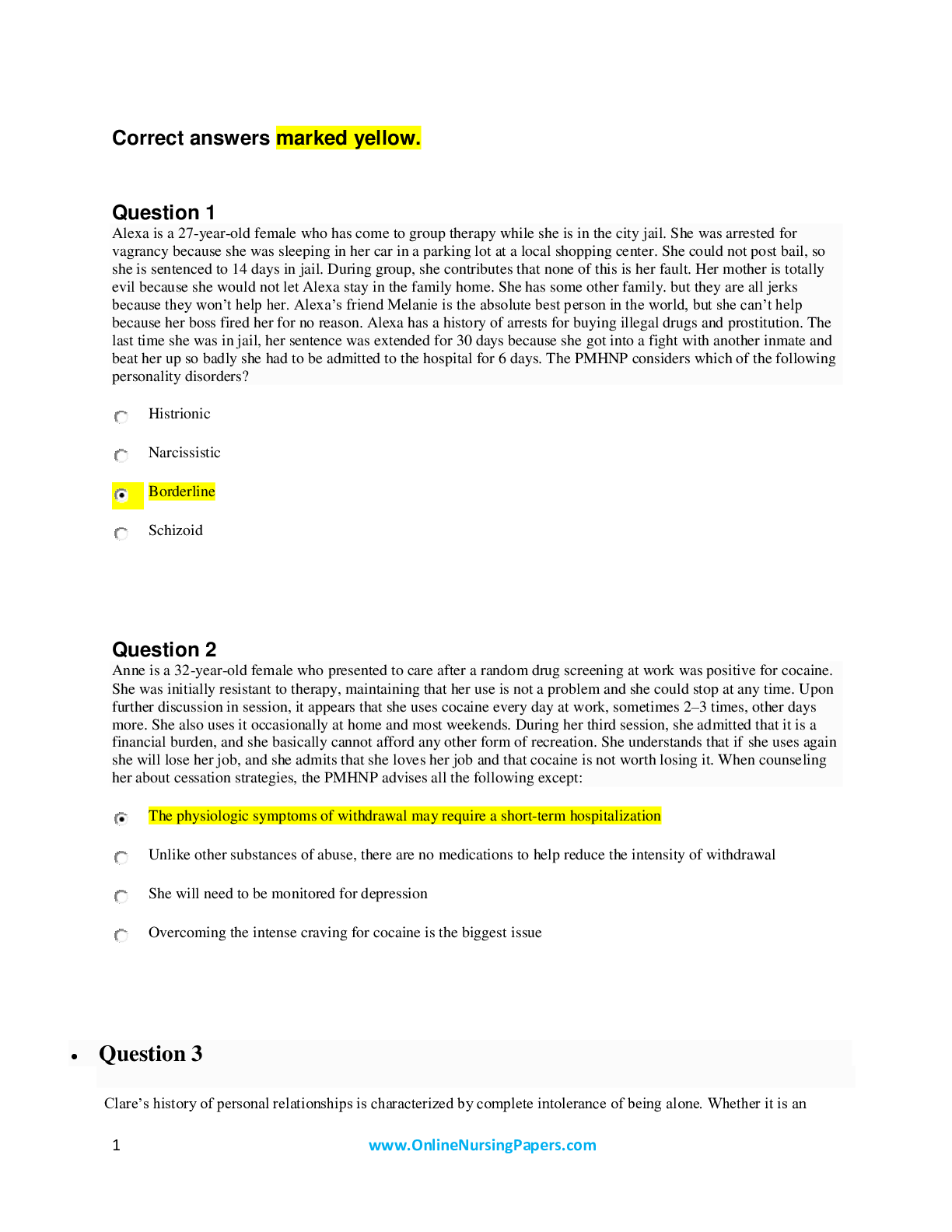
Buy this document to get the full access instantly
Instant Download Access after purchase
Buy NowInstant download
We Accept:

Reviews( 0 )
$10.00
Can't find what you want? Try our AI powered Search
Document information
Connected school, study & course
About the document
Uploaded On
Jan 06, 2021
Number of pages
21
Written in
All
Additional information
This document has been written for:
Uploaded
Jan 06, 2021
Downloads
1
Views
157







.png)



